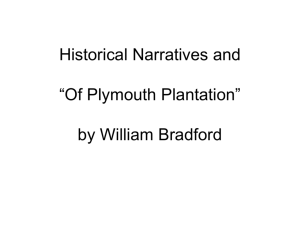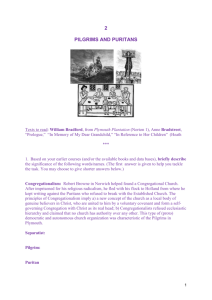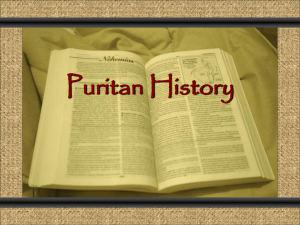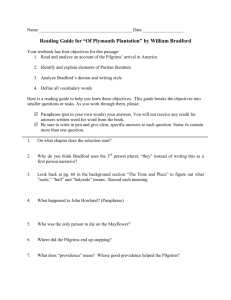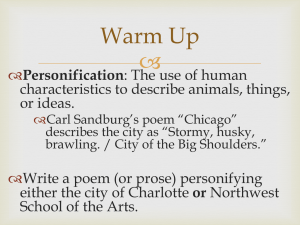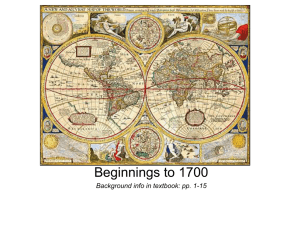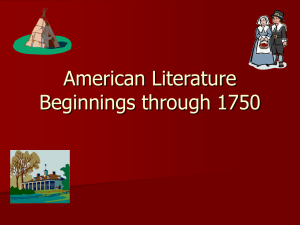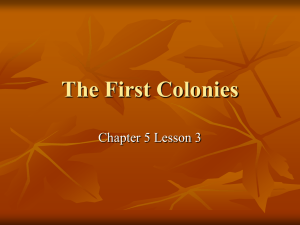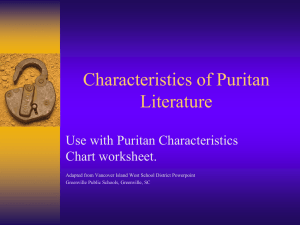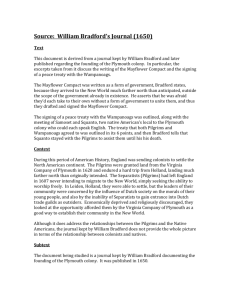Unit 1: Puritanism William Bradford *Of Plymouth Plantation*
advertisement
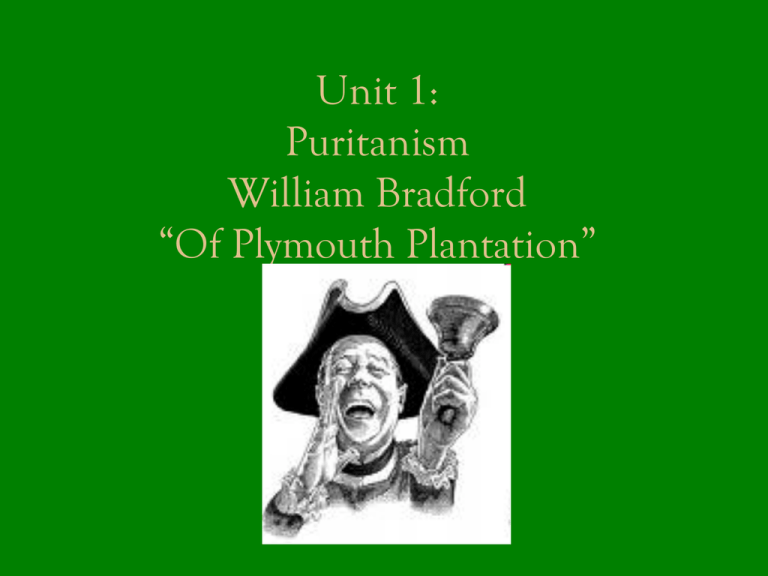
Unit 1: Puritanism William Bradford “Of Plymouth Plantation” The Puritan Philosophy Basic Timeline 1630: The Great Migration to New England (Puritans) 1690 1745 The Great Awakening 1636: Harvard College founded 1692: The Salem Witch Trials 1620: Mayflower lands (W. Bradford) with 100 pilgrims The Puritan Age Puritanism: a definition • As a religion it stems from Roman Catholic Catholics Church of England (Anglican) Puritan (to purify) • As a way of life it is based on God and his teachings •Puritans lived in a THEOCRACY – Church = » Elders » Ministers = » Bible teachings State government/law Puritan Views: • View of God – – – – All-powerful All-knowing Revengeful Just/fair • View of Man – Sinful – Unworthy of salvation •View of Nature - Used by God as a way to punish or reward man Puritan Tenets (beliefs): 1. The Bible is the inerrant (without errors) word of God and an outline for living 2. Special people (good Puritans) have been chosen by God to carry out certain actions 3. Your eternal destiny is decided before you are born. How you live life hints to this destiny. 4. In all aspects of life, be pragmatic (practical) and avoid frivolous (unnecessary) activities. 5. “Work is necessary and good for you.” Puritan reasons for writing: • Puritan literature is both PRAGMATIC and THEOCRATIC • Reasons for writing are – – – – – Loneliness To describe the new land For support from Europe To explain action (esp. W. Bradford) For religious purposes (esp. J. Edwards) William Bradford & Of Plymouth Plantation William Bradford: bio • Son of an English farmer • Was the typical first New England settler • Extremely religious; joined a group of Puritans • Fled from England to Holland and then to America because of religious persecution • Reached Plymouth in 1620 aboard the Mayflower • Wife either jumped or fell overboard and drowned • 1st winter in America ½ the settlers died • Became governor of Plymouth (re-elected 30+ times Bio, cont. • Wrote Plymouth’s history (began in 1630 and ended in 1647) • 200 years later the manuscript was published • Bradford was disappointed that America fell short of its promise • Of Plymouth Plantation describes – Puritan’s flight from England to Holland to America – The trials of the 1st winter – The bloody Pequot War “Of Their Voyage, and How They Passed the Sea; and of Their Safe Arrival to Cape Cod” • Voyage was a mix of fair winds and fierce storms • One of the main beams bowed and cracked ½ way through the journey • Repaired the beam with a great iron screw (to raise it) and a post (to secure it) • Again, pilgrims believed that God would be fair to them – “So they committed themselves to the will of God and resolved to proceed” (59) • God saves a good Puritan from drowning – John Howland was thrown into the sea during a storm – “it pleased God that he caught hold of the topsail halyards” (59) – John Howland “lived many years and became a profitable member both in church and commonwealth” (his good life yielded a good fate) • One person (besides the seaman) perished on the voyage, William Butten • They first try to land @ Cape Cod • Then they decide to travel south down the Hudson (meet with rough waters) • Ultimately, they docked @ Cape Harbor • They landed in winter with no friends to meet them & no place for them to go • Bradford declares his trust in God to get them through – “What could now sustain them but the Spirit of God and His Grace?” (61) Book 2: “The Starving Time” • In 2 or 3 months’ time, ½ the ship’s passengers died – Lack of proper housing – Infected with scurvy • 6 or 7 Puritans were healthy enough to care for the others (chosen by God) • The seamen were greedy and selfish, keeping food and drink for themselves even with the passengers so sick. • The seamen began falling ill too • Nearly half of the seamen died before they set sail again • The pilgrims were much more willing to help each other in times of need and illness • The seamen were more barbaric and selfcentered. They cursed each other instead of caring for each other “Indian Relations” • Samoset, an Indian that approached the pilgrims, helped them become familiar with the land • Squanto and the pilgrims set terms under which they would all live. These terms primarily favored the pilgrims. Squanto continued with the pilgrims as their interpreter and was “sent from God.” He aided the pilgrims until he died “Of Plymouth Plantation” tasks • Write a short response to video clip • Create a timeline of events for the excerpt.
